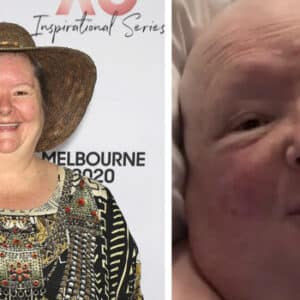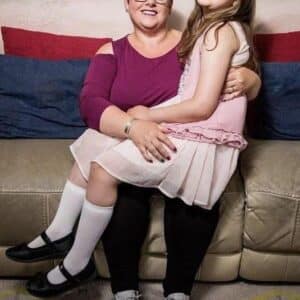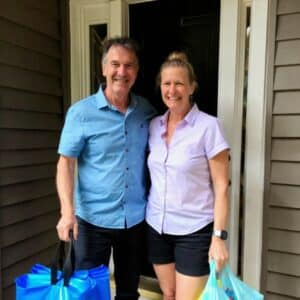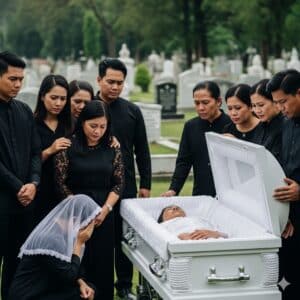I was sitting outside the store with my knees pressed together, balancing a paper-wrapped sandwich on my lap like it was something too precious to disturb. My boyfriend, Arman, was inside trying on three versions of the same black shirt.
That sandwich wasn’t just food—it was a prize. I’d traveled two train stops out of my way for it. The bakery with the navy walls only made twenty each day, and the bread cracked like kindling around herbed chicken, fennel slaw, and a lemony spread that smelled like heaven itself. I hadn’t been in this neighborhood since grad school, so I planned to eat it right there, savoring the nostalgia.
Then she sat down beside me.
The old woman moved carefully, as though apologizing for every step. Her coat was worn, missing a button, and her hands folded neatly in her lap. Strands of gray threaded through her bun, tied too loosely to hold. Her eyes drifted toward my sandwich—not with greed, but with the quiet patience of someone used to waiting for less.
When our eyes met, she smiled, soft and almost invisible. “Enjoy your meal, sweetheart. You look exactly like my granddaughter.”
“Really? Then she must have been beautiful,” I said, trying to ease the sudden weight of the moment.
“She was,” the woman replied. “She died two and a half years ago. I’ve been… existing ever since.”
Her words landed like stones in still water. Without thinking, I tore the sandwich in half and offered it to her.
“Are you hungry?”
Her eyes shimmered instantly, as if hunger had been a secret she wasn’t meant to reveal. She nodded, hesitantly, almost embarrassed.
“Please,” I insisted, pressing the half into her hand. “Eat this while I grab some groceries for you. I’ll be right back.”
She resisted with murmurs about kindness being too much, but I pushed gently until she accepted. Inside, I filled a basket with oatmeal, soup, tea, fruit, and bread. I thought about her folded hands the entire time. But when I returned to the bench, she was gone. Only a small piece of crust remained.
Arman kissed my temple and said I had done what I could, but my chest ached with the feeling of incompleteness. That night in bed, one sentence kept circling: “You look exactly like my granddaughter.”
I pulled out an old shoebox from the back of my closet, brushing away the dust. Inside were fragments of a history I didn’t fully know: a hospital bracelet, a yellowed newspaper clipping, and a torn photograph. My half showed a woman holding a baby. Her smile looked like mine. On the back, one word was written: Stay.
The next day, a knock sounded at the door. When I opened it, the woman from the bench stood on my porch. “I’m sorry I left,” she said quickly. “I didn’t want you spending money on me. My name is Tamara.” She handed me a glossy square photo.
The moment I saw the edges, my breath caught. It was the missing half of my picture, torn along the exact same line. Together, they matched perfectly—two halves of the same story.
Shaking, I brought out my shoebox and pressed the photos together. Arman stood behind me, one hand between my shoulder blades, as Tamara whispered, “It means I have something to tell you. May I come in?”
Over tea, she told me about her granddaughter—Alina. My twin sister. Our mother, Daria, had been young and poor. She couldn’t raise two babies, so through adoption, she made the painful choice to let one go. Me.
“My daughter carried that guilt,” Tamara said, voice trembling. “But she loved you. And Alina always knew you existed. On her last birthday, she wrote a list. The first thing on it was ‘Find my sister.’”
My throat closed. “She wanted to find me?”
Tamara nodded. “And she believed it would happen when the world thought it was time.”
I thought of my shoebox. Of the sandwich. Of the way fate threads itself through ordinary days.
Later that night, I told my adoptive mother everything. She listened quietly, then said, “Bring her. Bring the pieces. Bring Tamara.” When we arrived, she hugged us both as if we’d been hers all along.
Over the next weeks, Tamara and I stitched fragments of Alina’s life together—photos, stories, small rituals. I learned she painted one kitchen wall yellow for warmth, hummed when nervous, and bought two sandwiches just to leave one for someone else in need.
I returned to the bakery where she’d done this. The owner froze when she saw me. “Alina?” she whispered.
“No,” I said softly. “Her sister.”
We left behind two sandwiches in her memory.
That night, walking with Arman under string lights by the gelato stand, I confessed that I felt both broken and complete. I had lost a sister I never knew, but I had found a family I didn’t expect.
He laced his fingers through mine. “Then maybe this is what it means to be found,” he said.
For the first time in years, life felt less like wandering, and more like arriving.





